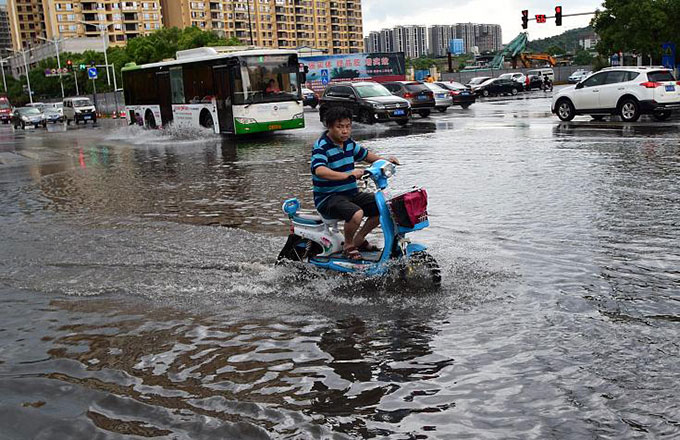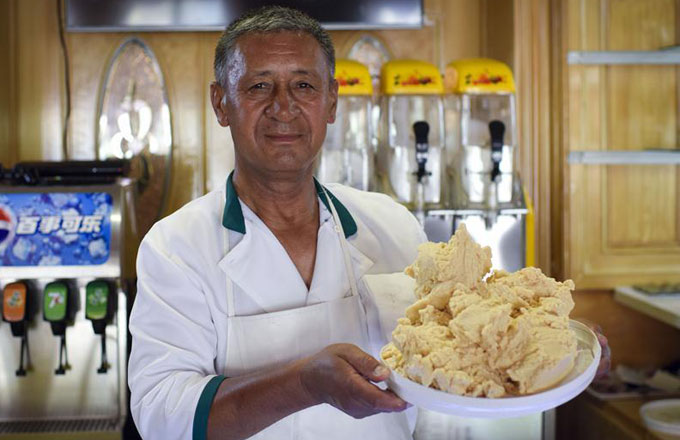Special funding undergoes audit
Money designated to improve people's livelihoods are common graft targets
Social sectors that are closely related with people's livelihoods have become a major target of this year's annual audit report as the country is progressing toward a moderately prosperous society by 2020.
The central government invested a total of 60 billion yuan ($8.78 billion) in special funds for poverty relief in 2016. The National Audit Office had visited 16,600 poverty-stricken families from 158 counties and audited the use of about 33.6 billion yuan of the funds, said Hu Zejun, auditor general of the National Audit Office.
While most of the funds were used efficiently and 12.4 million people were pulled out of poverty last year, auditors have also found some problems, he said.
"The information of 113,400 registered poverty-stricken people was found to be inaccurate or not updated. Some who have bought high-end vehicles or apartments were still registered as poverty-stricken," Hu said.
He said that auditors had found 141 million yuan of poverty relief funds were improperly spent, as some projects were used for other purposes after completion or abandoned, and 1.95 billion yuan of funds in 84 counties were idle.
Hu made the remarks while delivering an annual audit report to the Standing Committee of the National People's Congress. The legislature is holding its bimonthly session, which will last until Tuesday.

The report also revealed that 474 medical institutes had sold medicine or medical materials worth of 537 million yuan at inflated prices.
More than 1 billion yuan in special funds for affordable housing projects were embezzled for commercial real estate development or office expenditures, the report found, while 54,900 families that were not qualified for affordable houses passed local government verification.
"The corruption of low-level officials is a problem in areas closely related to people's livelihoods," said Hu, adding that auditors had found 450 corrupt grassroots officials involved in more than 300 cases connected with poverty relief, social security and ecology protection in the past year.
The National Audit Office has transferred evidence to judicial departments on more than 600 disciplinary or legal violations, involving about 1,100 officials, in the past year, Hu said.
Jiang Jianghua, director of the audit science research institute under the National Audit Office, said that the shift of attention in this year's "audit storm", which put more importance on people's livelihoods, would bring the public practical benefits.
Wang Dehua, director of the audit research office at the Chinese Academy of Social Sciences, said the audit work is consistent with the emphasis of the central leadership.
"As China is strengthening efforts in building a moderately prosperous society, the government has attached more attention to people's livelihoods. Stricter scrutiny over such areas can help the government better achieve the target," he said.
Wang also said that the central government not only audits the use of the funds but also pays attention to the qualification of those who benefit, which is also key to ensuring the funds are used properly.
Highlights
The National Audit Office audited the debt of 16 provincial governments, 16 prefecture-level city governments and 14 county governments and found that the debt these governments had promised to repay with their fiscal revenues at the end of March 2017 had increased 87 percent from the end of June 2013.
Under the promise to repay in such manner, a total of 53.7 billion yuan ($7.9 billion) was borrowed from banks and trust financing by some of those governments, which is deemed to have violated relative rules.
The audit of 842 domestic projects of 20 enterprises found 60.6 billion yuan at risk due to bad decisions or poor management in major investments, share acquisitions and project construction; 61 of these companies' 155 overseas projects were also found to be at risk.
Three of the 20 central State-owned companies that were audited failed to weed out outdated capacity as required by the central government. Three of the 18 provinces that were audited were found to have 67 coal mines with total capacity of 12.6 million metric tons that should have been closed or were given production permits not in accordance with regulations. These governments were also found to be violating the regulations and gave permits to iron mills with output capacity of 1.33 million tons.

























